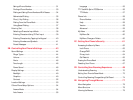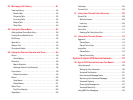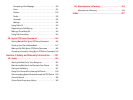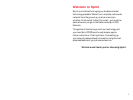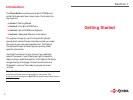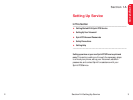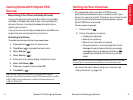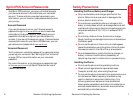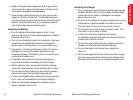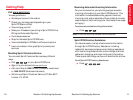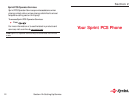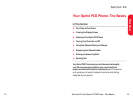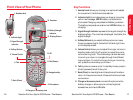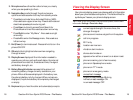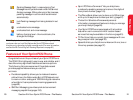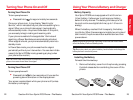
Section 1A: Setting Up Service 9
Handling the Charger
ⅷ
Only use a power source that provides the appropriate
voltage (AC100~240 V) for the charger. An unsuitable
power source can result in damage to the charger,
electric shock or fire.
ⅷ
Do not use the charger if the power supply cord or plug
is damaged or frayed (exposed or broken wires, etc).
This can result in the risk of fire or electric shock.
ⅷ
Do not short circuit the charger connector jack. This
may result in fire or electric shock.
ⅷ
In the event that liquid is spilled into the unit,
immediately unplug the charger from the wall outlet to
prevent fire or electric shock.
ⅷ
To avoid the risk of electric shock, always unplug the
charger from the wall outlet before cleaning.
ⅷ
To avoid damage, do not place heavy objects on
the cord.
ⅷ
To avoid damage and the risk of electric shock, always
grip the power plug when removing the charger from
the wall outlet. Do not pull on the power supply cord.
Setting Up Service
8 Section 1A: Setting Up Service
ⅷ
Keep all storage media (magnetic cards, floppy disks,
credit cards, etc.) away from the phone. Close contact
can erase or damage the storage media.
ⅷ
Keep all sharp metal objects (pins, nails, hairpins etc.)
away from the phone handset. The handset earpiece
contains a strong magnet that can attract and hold metal
objects. To avoid personal injury, remove any objects
from the handset earpiece before using.
Handling the Battery
ⅷ
Do not dispose of the battery pack in a fire. It may
explode. Check with local waste management codes for
disposal instructions.
ⅷ
Do not force the battery pack into the phone. Improper
installation can cause malfunctions or damage the
battery pack. This may result in fire or personal injury.
ⅷ
Use caution in handling batteries in order not to short
the battery on conductive materials such as rings,
bracelets, and keys. The battery and/or conductor may
overheat and cause burns.
ⅷ
If the battery becomes too hot while recharging, it
should be removed immediately from the charger.
ⅷ
When clothes or skin are exposed to battery leakage,
rinse with clean water at once to prevent skin irritation.
ⅷ
Do not use a cracked, leaking or odor-emitting battery
pack near an open flame or high temperatures.
ⅷ
If a fully discharged battery is stored for a long period of
time, it may not be possible to recharge the battery.
ⅷ
Observe local waste management codes for proper
battery disposal instructions.



